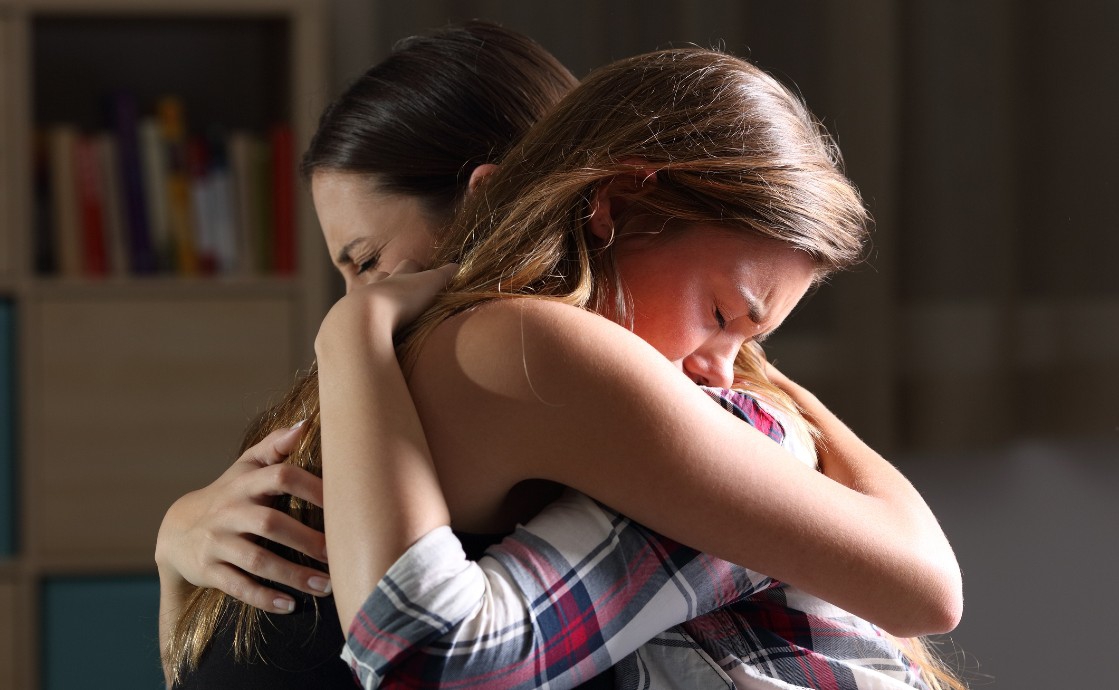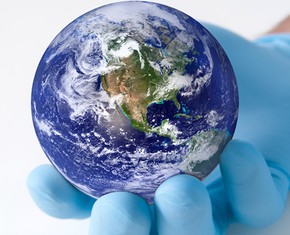The views expressed in our content reflect individual perspectives and do not represent the authoritative views of the Baha'i Faith.
A few days ago, my 10-year-old daughter sat next to me while I was doing yoga in the garden and said, “Mom, I don’t want you to ever die.” The sun was burning, and the exercises had already exhausted me, but it was her words that took my breath away.
Many children have lost their grandparents during the pandemic, and I strongly believe that explaining to them what happens to us after we die is very important to help them in the process of accepting the loss of a loved one.
The night my father passed away, two months ago, my children heard me crying in the next room. I couldn’t hide my sadness. I think they had never seen me cry before, and it was shocking for them. But at the same time, it was very easy for them to understand that something terrible had just happened.
It never crossed my mind to hide from them the dramatic situation we were in. I let them have a good cry with me, and I felt like we hugged for hours. I knew that my children needed to fully experience the sadness of that moment. When I was finally able to speak, with a faltering voice due to intense grief, I reminded them of the teaching of the prophet and founder of the Baha’i Faith that gave me hope: “Baha’u’llah has promised that this separation will be short. Soon we will be able to hug my dear father once again.”
That night was definitely the longest night of our lives. We talked about how the Baha’i Writings compare this world to the mother’s womb. Just as a baby, after having developed its organs and limbs in the womb, leaves its small world behind and is born into this world, we will be born into that next world one day, after having developed spiritual qualities such as kindness, selflessness, and justice. Abdu’l-Baha, the son of Baha’u’llah, further explained:
“Consider how a being, in the world of the womb, was deaf of ear and blind of eye, and mute of tongue; how he was bereft of any perceptions at all. But once, out of that world of darkness, he passed into this world of light, then his eye saw, his ear heard, his tongue spoke. In the same way, once he hath hastened away from this mortal place into the Kingdom of God, then he will be born in the spirit; then the eye of his perception will open, the ear of his soul will hearken, and all the truths of which he was ignorant before will be made plain and clear.”
We talked about the patience their grandfather had. He had waited so many years since his parents died, and now he was finally going in search of that long-awaited reunion. I assured them that, despite our sadness, this day was very special for their grandpa and that he was definitely enjoying the afterlife. Abdu’l-Baha wrote about how spiritual bonds between people persist in the next world:
“The mysteries of which man is heedless in this earthly world, those will he discover in the heavenly world, and there will he be informed of the secret of truth; how much more will he recognize or discover persons with whom he hath been associated. Undoubtedly, the holy souls who find a pure eye and are favored with insight will, in the kingdom of lights, be acquainted with all mysteries, and will seek the bounty of witnessing the reality of every great soul. Even they will manifestly behold the Beauty of God in that world. Likewise, will they find all the friends of God, both those of the former and recent times, present in the heavenly assemblage.”
So they could sleep on that sad night, I promised them that in their dreams grandpa would come to visit them. I told them that the world of dreams was part of the spiritual worlds and that there they could hug and talk to their grandfather because the barriers of time and space no longer existed. “Even if you don’t remember it tomorrow, or think you haven’t dreamt anything, rest assured that if you wish with all your heart, he will be able to visit you,” I said.
The next morning, to my astonishment, my daughter came to me with a radiant and luminous face to tell me how that fascinating reunion in her dreams with her grandfather had been.
Abdu’l-Baha explained: “In prayer there is a mingling of station, a mingling of condition. Pray for them as they pray for you! When you do not know it, and are in a receptive attitude, they are able to make suggestions to you, if you are in difficulty. This sometimes happens in sleep.”
Explaining to children what the Baha’i Writings say helps them develop an abstract way of thinking about life and death. My children now understand that death is not the end, and they are certain that they will see their beloved grandfather again someday, even though they still miss him very much. That morning in the garden I told Rafaella: “I’m never going to die. My body will remain here one day, however, I will not die, my soul will travel to the next world to meet your grandfather and there we will wait for you until it’s your time. In the meantime, we have to develop the virtue of patience to wait for that next reunion.”
I believe that helping them face death in this way prepares them for life, which in one way or another is full of losses. Helping them understand the irreversibility of death on this physical plane and the passing to the next life according to Baha’i Writings is truly a gift.
Even if we never understand what that transition will be like, we should encourage them to develop an abstract thought about it. Baha’u’llah said that “the nature of the soul after death can never be described, nor is it meet and permissible to reveal its whole character to the eyes of men.” But he comforts us by explaining that the soul, after its separation from the body, will continue to progress until it reaches the presence of God.
Life in the first days, weeks, or months after a loss can seem very strange, as one gets used to the physical absence. Talking with our children about the pain, sadness, or joy that our memories bring seems essential to helping them manage anxiety. I don’t think we should ever pretend to forget or not to talk about the person who has passed. On the contrary, it’s always better to remember the special place that person has in our hearts and to pray for them together.
When they asked me: “Mom, how far away is the next world? Where is heaven?” I explained, paraphrasing Abdu’l-Baha, that just like minerals can’t understand the vegetable kingdom, and just like the vegetable kingdom is separate from the animal kingdom and cannot understand it despite being so close, we can never understand the essence of the spiritual kingdom. But it is very close to us, even though we cannot perceive it with our senses. The Baha’i Faith explains that “this transformation can never be rightly considered annihilation, for the elements of composition are ever present and existent as we have seen in the journey of the atom through successive kingdoms, unimpaired; hence, there is no death; life is everlasting.”
I firmly believe that we must educate our children for life, and also to face death when the time comes. I believe that it is essential to help them develop spiritual qualities such as patience, detachment, love for God, faith, and divine knowledge. I know my dad would have wanted me to be more prepared to face his death, and I lacked many qualities to do so. Now my children and I are practicing them together: detachment, compassion, patience — one by one, all those spiritual qualities that will one day be like our eyes, ears, and limbs in the world to come.
















Comments
Sign in or create an account
Continue with Googleor